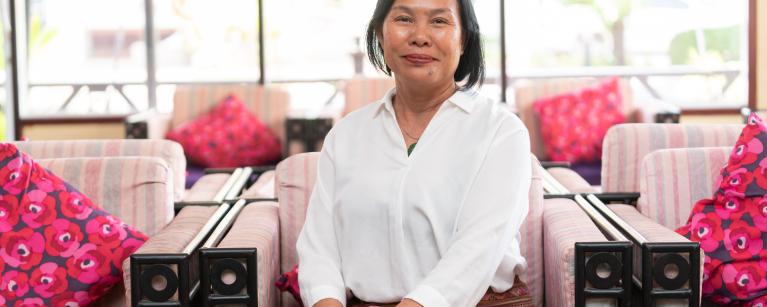SOLAR Project: Vansy Senyavong Gender equality: Empowering communities in the northern Lao People’s Democratic Republic

Vansy Senyavong Gender equality: Empowering communities in the northern Lao People’s Democratic Republic
Gender equality is not just a fundamental human right, but a crucial element for achieving a harmonious society where individuals can reach their full potential and where sustainable development can thrive. In many developing countries, including the Lao People’s Democratic Republic, entrenched cultural traditions and norms have posed challenges to promoting gender equality. However, recent efforts by various non governmental and international organizations are making strides in advancing this cause even in the country’s most remote regions.
In the northern province of Bokeo, a grassroots organization known as Maeying Huamjai Phattana (MHP, or Women Mobilizing for Development) is working tirelessly to uplift rural communities by enhancing livelihoods, ensuring access to healthcare and social security, and promoting gender equality. Vansy Senyavong, the Chief Director of MHP, emphasizes the importance of empowering women and youth through education and sustainable income generation from agriculture and forest resources.
Through support from the SOLAR Project, a European Union-funded initiative implemented by the ILO and Oxfam, MHP is facilitating training sessions for villagers on gender equality, disability rights, and social inclusion. These initiatives have not only enhanced understanding but have also fostered a sense of shared responsibility among community members towards protecting their environment and promoting gender equality.
Ms Vansy explained that the idea to create MHP came to her at a party celebrating the ending of an international NGO project in Bokeo Province. At the party, most of the men were having a meal and drink with the guests, while the women were working in the kitchen in the back of the house and allowed only the young girls to join the party. She noticed some women and the kids eating on the f loor and when they came closer to the party area they were harassed by the men. Ms Vansy felt this was unfair and immediately decided to do something to promote gender equality. Ms Vansy established MHP in 2010 and has since conducted more than 30 projects, including seven recent projects focusing on improving the quality of lives in rural areas. Despite the deeply rooted patriarchal norms in the country, efforts to shift mindsets towards gender equality are gradually gaining momentum. Ms Vansy acknowledges the challenges of introducing this concept, particularly among ethnic groups in remote areas, like the Hmong and Khmu.
To overcome resistance, MHP employs innovative approaches like the Gender Action Learning System (GALS), which engages participants in activities that prompt critical thinking about family dynamics, poverty alleviation and gender roles. GALS does not aim to overtly explain or promote concepts of gender equality, but rather empowers participants through simple drawing activities. Through GALS activities, which also involve separate group discussions for men and women, participants reflect on their roles and responsibilities in family and work situations, as well as their hopes and aspirations. This approach has led to transformative changes, with men acknowledging societal pressures to always appear strong and women expressing desires for greater decision-making power within their families. According to Ms Vansy, three key improvements have been observed after these training sessions. First, a number of men in remote target villages have changed their mindsets and behaviours. Previously, they would assign all the household responsibilities to women, resulting in women working excessive hours without sufficient time to relax, while men had ample time to socialize and indulge in leisure activities. Second, the number of women attending meetings, seminars and workshops has increased, allowing them to share their ideas about problem-solving.
“Lastly, the staff in our team have enhanced their gender-related skills, both in their work and personal lives,” Ms Vansy said, demonstrating that even the trainers are directly benefiting from the sessions with villagers. By fostering dialogue and introspection on gender norms and equality, initiatives like those of MHP are paving the way for inclusive development and empowerment in the Lao People’s Democratic Republic. As communities continue to engage in these conversations and activities, the seeds of change towards a more equitable society are being sown, one drawing at a time.